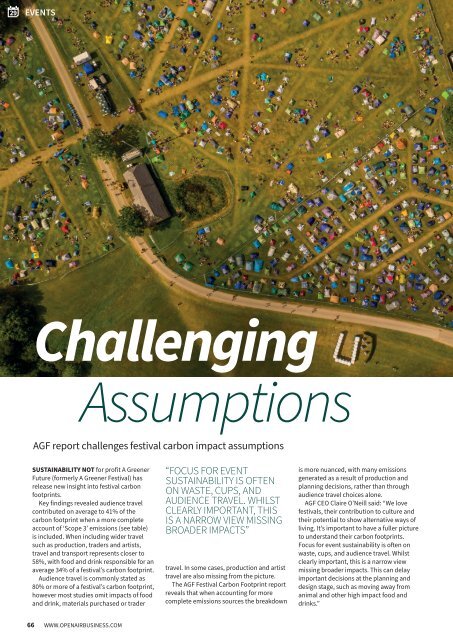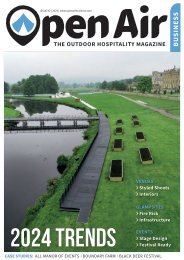Issue 60
The UK's outdoor hospitality business magazine for function venues, glamping, festivals and outdoor events
The UK's outdoor hospitality business magazine for function venues, glamping, festivals and outdoor events
You also want an ePaper? Increase the reach of your titles
YUMPU automatically turns print PDFs into web optimized ePapers that Google loves.
EVENTS<br />
Challenging<br />
Assumptions<br />
AGF report challenges festival carbon impact assumptions<br />
SUSTAINABILITY NOT for profit A Greener<br />
Future (formerly A Greener Festival) has<br />
release new insight into festival carbon<br />
footprints.<br />
Key findings revealed audience travel<br />
contributed on average to 41% of the<br />
carbon footprint when a more complete<br />
account of ‘Scope 3’ emissions (see table)<br />
is included. When including wider travel<br />
such as production, traders and artists,<br />
travel and transport represents closer to<br />
58%, with food and drink responsible for an<br />
average 34% of a festival’s carbon footprint.<br />
Audience travel is commonly stated as<br />
80% or more of a festival’s carbon footprint,<br />
however most studies omit impacts of food<br />
and drink, materials purchased or trader<br />
“FOCUS FOR EVENT<br />
SUSTAINABILITY IS OFTEN<br />
ON WASTE, CUPS, AND<br />
AUDIENCE TRAVEL. WHILST<br />
CLEARLY IMPORTANT, THIS<br />
IS A NARROW VIEW MISSING<br />
BROADER IMPACTS”<br />
travel. In some cases, production and artist<br />
travel are also missing from the picture.<br />
The AGF Festival Carbon Footprint report<br />
reveals that when accounting for more<br />
complete emissions sources the breakdown<br />
is more nuanced, with many emissions<br />
generated as a result of production and<br />
planning decisions, rather than through<br />
audience travel choices alone.<br />
AGF CEO Claire O’Neill said: “We love<br />
festivals, their contribution to culture and<br />
their potential to show alternative ways of<br />
living. It’s important to have a fuller picture<br />
to understand their carbon footprints.<br />
Focus for event sustainability is often on<br />
waste, cups, and audience travel. Whilst<br />
clearly important, this is a narrow view<br />
missing broader impacts. This can delay<br />
important decisions at the planning and<br />
design stage, such as moving away from<br />
animal and other high impact food and<br />
drinks.”<br />
66 WWW.OPENAIRBUSINESS.COM

















